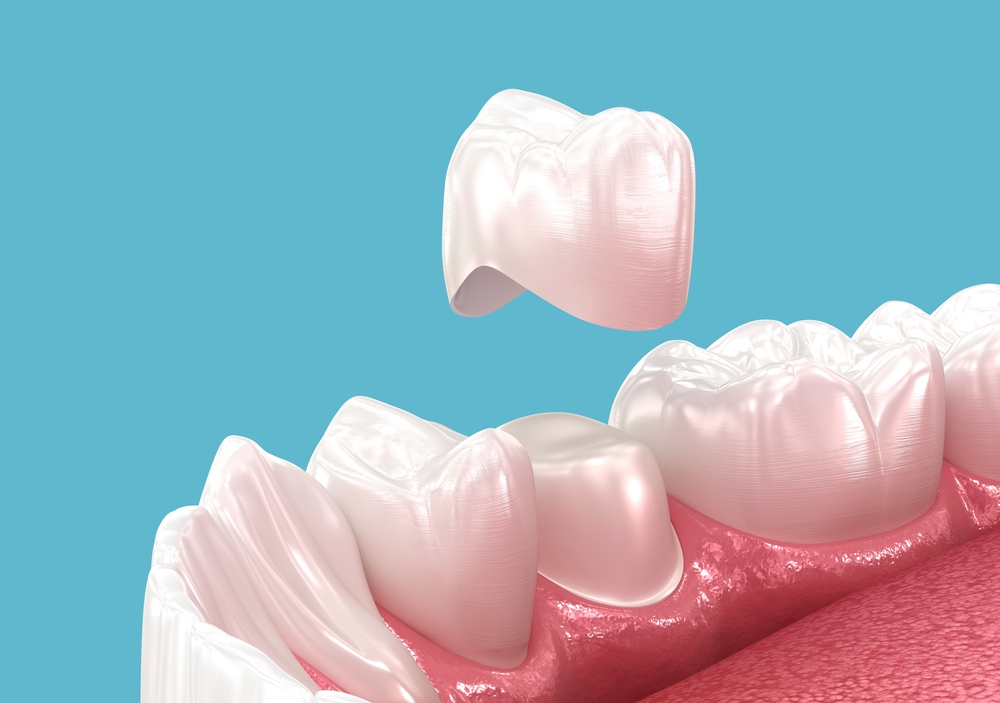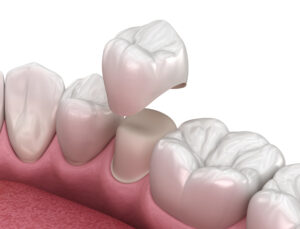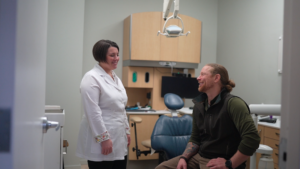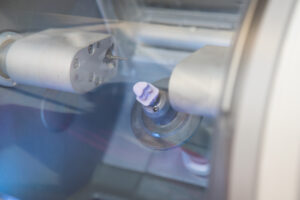Do You Need a Porcelain Dental Crown?
Are you looking for a time-tested dental crown solution to protect your smile? Porcelain dental crowns are a transformative solution for patients seeking to restore and enhance damaged, discolored, or misaligned teeth. As a leading Gallatin County dental practice, Bozeman Gentle Dentistry has helped numerous patients achieve stunning, resilient smiles that boost confidence and oral health.
What Are Porcelain Crowns?
Porcelain crowns provide comprehensive coverage for damaged teeth, meticulously crafted to match the precise size, shape, and color of your natural teeth. These custom restorations not only improve functionality but also deliver exceptional aesthetic results. Porcelain’s ceramic composition closely mimics natural tooth enamel’s color and translucence, making it an ideal material for visible teeth when smiling or speaking.
Types of Porcelain Crowns
- Full Porcelain/Ceramic Crowns: Entirely constructed from porcelain, these crowns offer the most natural color match and are particularly suitable for patients with metal sensitivities.
- Porcelain-fused-to-metal (PFM) Crowns: Combining a metal base with a porcelain exterior, these crowns provide both strength and aesthetic appeal. The potential drawback is a possible thin dark line visible at the gum line.
- E-Max Crowns: These are made from lithium disilicate ceramic and offer a balance of strength and aesthetics. E-Max crowns can be either layered or monolithic13.
- Empress Porcelain Crowns: Although losing popularity due to lack of strength, these crowns can be made to appear natural. They consist of a medium-strength coping with a weaker baked-on top layer1.
- Zirconia Crowns: While not strictly porcelain, zirconia crowns are often categorized as porcelain crowns. They offer exceptional strength and can be made as full-contour or layered restorations13.
- Feldspathic Porcelain Crowns: These traditional porcelain crowns are known for their excellent aesthetics but may not be as strong as newer materials.
- Leucite Reinforced Porcelain Crowns: Similar to Empress crowns, these crowns are made from a glass-ceramic material that includes leucite crystals to enhance strength and durability. They offer improved fracture resistance while maintaining excellent translucency and a natural appearance, making them suitable for both anterior and some premolar restorations.
Benefits of Porcelain Crowns
- Durability: Porcelain dental crowns are engineered to withstand daily oral functions like chewing and speaking, porcelain crowns are remarkably resilient.
- Aesthetics: These dental crowns are designed to seamlessly blend with your natural dentition, these crowns create a harmonious, indistinguishable smile.
- Stain-Resistance: Porcelain’s inherent properties prevent discoloration, maintaining a bright, white appearance over time.
- Versatility: Porcelain dental crowns address a wide range of dental concerns, from chipped and cracked teeth to misshapen or discolored dental structures.
- Biocompatibility: Porcelain crowns are hypoallergenic and well-tolerated by the body, making them suitable for patients with metal sensitivities.
- Comfort: Custom-made porcelain crowns offer a comfortable fit, often feeling natural in the mouth within days of placement.
- Protection: Porcelain crowns can protect weakened or damaged teeth from further decay or injury, preserving the remaining healthy tooth structure.
- Low Maintenance: Dental crowns made from porcelain require no special care beyond regular brushing and flossing, making them easy to maintain.
- Functionality: These dental crowns restore optimal bite function and can help maintain proper jaw alignment.
Drawbacks of Porcelain Crowns
- Cost: Porcelain crowns typically represent a more significant investment compared to alternative dental restorations. Their aesthetic appeal and customization often result in higher prices, which may not be fully covered by insurance.
- Sensitivity: Some patients might experience temporary increased tooth sensitivity post-procedure, particularly to hot and cold temperatures. This hypersensitivity can be painful and may persist for some time after crown placement.
- Potential for Chipping: While durable, porcelain can crack or chip under excessive force or trauma. This fragility makes porcelain crowns more susceptible to damage from hard biting, chewing, or impacts, especially compared to metal alternatives.
- More Tooth Reduction: Porcelain crowns often require more extensive removal of the original tooth structure to ensure proper fit and durability. This additional grinding can potentially weaken the underlying tooth.
- Wear on Opposing Teeth: The hardness of these dental crowns can potentially cause more wear on the opposing natural teeth, especially if the crown’s surface is not perfectly smooth.
The Porcelain Dental Crown Process
Consultation and Evaluation
Dr. Murphy will conduct a comprehensive examination, discussing your dental goals and treatment options. Diagnostic imaging, including X-rays, will be taken to assess the tooth’s condition and surrounding bone structure.
Digital impressions or physical molds of your teeth will be made to help design your personalized treatment plan. The dentist will also check for any underlying issues that may need to be addressed before crown placement.
Tooth Preparation
After determining porcelain crowns as the optimal solution, Dr. Murphy will carefully prepare the affected tooth. This involves removing any decay, old fillings, or damaged portions of the tooth. The tooth is then reshaped and reduced by about 1-2 mm on all sides to accommodate the crown. Local anesthesia is administered to ensure your comfort during this process.
Impressions
Precise impressions of the prepared tooth will be taken using either traditional putty materials or advanced digital scanning technology. These impressions capture the exact dimensions and contours of your prepared tooth and surrounding teeth. The impressions are then sent to a dental laboratory where skilled technicians will craft your custom-fitted porcelain crown.
Temporary Crown
A temporary crown, usually made of acrylic, will be placed over the prepared tooth. This protects the tooth and maintains proper bite alignment during the two to three weeks it takes for the permanent crown to be fabricated. Dr. Murphy will provide instructions on how to care for your temporary crown.
Crown Placement
Once your custom porcelain crown is ready, you’ll return for a second appointment. Dr. Murphy will remove the temporary crown and thoroughly clean the prepared tooth. The permanent crown will be carefully placed and checked for proper fit, bite alignment, and color match. Any necessary adjustments will be made before the crown is permanently cemented in place.
Follow-Up
A follow-up appointment will be scheduled about one to two weeks after crown placement. During this visit, Dr. Murphy will confirm proper crown function, check for any bite issues, and address any potential sensitivity or discomfort. The dentist will also provide guidance on long-term care for your new porcelain crown to ensure its longevity.
Porcelain Crown Alternatives
- Composite Resin: A more affordable option for minor tooth restoration, though less durable than crowns. Composite resin can be used for small to moderate repairs and can be completed in a single visit. However, it may need more frequent replacement and is more prone to staining compared to porcelain crowns.
- Gold Crowns: Renowned for durability and minimal tooth reduction, preferred by some for posterior teeth. Gold crowns are extremely long-lasting and require less removal of natural tooth structure. They are ideal for back teeth due to their strength but are less popular for visible teeth due to their metallic appearance.
- Zirconia Crowns: A robust, tooth-colored ceramic option ideal for patients seeking strength and aesthetics. Zirconia crowns offer excellent durability, comparable to metal crowns, while providing a natural appearance. They are suitable for both front and back teeth and are resistant to chipping and breaking.
- CEREC® Crowns: Same-day crowns created using advanced CAD/CAM technology. These crowns are milled in-office from ceramic blocks, allowing for completion in a single appointment. They offer convenience and eliminate the need for temporary crowns, but may be limited in color matching compared to lab-created crowns.
- Onlays or Inlays: Partial tooth replacements suitable for moderate dental damage. These restorations cover only a portion of the tooth, preserving more natural tooth structure than full crowns. They are ideal for teeth with damage too extensive for fillings but not severe enough to require a full crown.
- Dental Veneers: Thin porcelain shells for enhancing front teeth’s appearance. Veneers are primarily used for cosmetic purposes on visible front teeth. They require less tooth reduction than crowns and can address issues like discoloration, minor chips, or slight misalignment.













